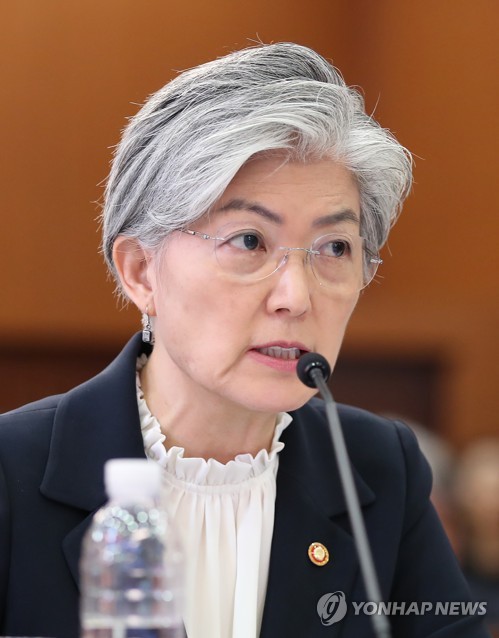- California Assembly OKs highest minimum wage in nation
- S. Korea unveils first graphic cigarette warnings
- US joins with South Korea, Japan in bid to deter North Korea
- LPGA golfer Chun In-gee finally back in action
- S. Korea won’t be top seed in final World Cup qualification round
- US men’s soccer misses 2nd straight Olympics
- US back on track in qualifying with 4-0 win over Guatemala
- High-intensity workout injuries spawn cottage industry
- CDC expands range of Zika mosquitoes into parts of Northeast
- Who knew? ‘The Walking Dead’ is helping families connect
S. Korea in talks with U.S. over joining nuclear inspection in N. Korea: official
SEOUL, Oct. 10 (Yonhap) — South Korea and the United States have been in close consultations over allowing South Korean experts to join a team that will inspect North Korea’s demolished nuclear test site, Seoul’s top diplomat said Wednesday.
Foreign Minister Kang Kyung-wha made the comments during an annual parliamentary audit of the ministry.

Foreign Minister Kang Kyung-wha speaks during a parliamentary audit of her ministry at its headquarters in Seoul on Oct. 10, 2018. (Yonhap)
North Korean leader Kim Jong-un told U.S. Secretary of State Mike Pompeo during their meeting in Pyongyang Sunday that outside inspectors would be allowed in to Punggye-ri to verify the facility’s destruction, according to the State Department.
North Korea carried out all six nuclear tests in Punggye-ri, located in the mountainous northeast of the country close to its borders with China and Russia.
In May, the North blew up tunnels of the underground test site in front of a group of international journalists to demonstrate its commitment to denuclearization.
But critics have downplayed the significance of the site’s destruction as a symbolic gesture with little bearing on the denuclearization of the regime.
Pompeo told reporters after leaving Pyongyang that the inspectors would be let in as soon as the logistics are worked out.
North Korea kicked out inspectors of the International Atomic Energy Agency in April 2009 and shortly thereafter conducted its second nuclear test.
Also Wednesday, Kang said “yes” when asked by an opposition lawmaker whether Pompeo expressed dissatisfaction during his phone conversation with Kang last month over a recent inter-Korean military agreement.
The agreement — adopted after last month’s summit between the leaders of the two Koreas in Pyongyang — calls for, among other things, halting military drills near the military demarcation line and withdrawing some border guard posts as part of efforts to reduce military tensions, prevent accidental clashes and build trust.












